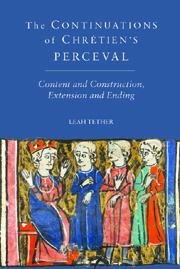Book contents
- Frontmatter
- Contents
- Acknowledgements
- Abbreviations and MS Sigla
- Introduction
- 1 Authorial Changeovers in the Manuscripts
- 2 Distinguishing Continuations, Sequels and Ends
- 3 The First Continuation and Prolongation
- 4 The Second Continuation and the Imitative Mode
- 5 The Gerbert and Manessier Continuations: Interpolation vs. Conclusion
- Conclusion
- Appendices
- Bibliography
- Index
- ARTHURIAN STUDIES
3 - The First Continuation and Prolongation
Published online by Cambridge University Press: 05 February 2013
- Frontmatter
- Contents
- Acknowledgements
- Abbreviations and MS Sigla
- Introduction
- 1 Authorial Changeovers in the Manuscripts
- 2 Distinguishing Continuations, Sequels and Ends
- 3 The First Continuation and Prolongation
- 4 The Second Continuation and the Imitative Mode
- 5 The Gerbert and Manessier Continuations: Interpolation vs. Conclusion
- Conclusion
- Appendices
- Bibliography
- Index
- ARTHURIAN STUDIES
Summary
The provisional assignment of Extension to the First Continuation
As was explained in the previous chapter, an Extension is a Continuation which extends the Ur-Text, but without providing an ‘end’. It was also noted that the First Continuation appears to be extending the story rather than concluding it, as the fact that the First Continuation gives rise to further Continuations would suggest a notion of unfinishedness. Indeed, Bruckner points out that the text clearly projects ‘the expectation that something else must follow’. Given Herrnstein Smith's notion of ‘the expectation of nothing’ as being crucial to a true ending, this means that the First Continuation may, at least as a preliminary, be assigned to the sub-genre of Continuation termed Extension, rather than that of Conclusion, because the text does not seem to provide an ‘end’ under our terms. But this is not enough to prove that the First Continuation is an Extension. This provisional assignment demands further clarification by means of enquiries into how the First Continuation extends the narrative and whether it is possible to provide a more specific definition of the type of Extension at work.
The issue of redactions
According to Roach's system for categorising the redactions of the First Continuation, there are three redactions: the Short, Mixed and Long. As was previously stated, however, each of these redactions in turn omits, interpolates and adds a number of episodes/objects/motifs.
- Type
- Chapter
- Information
- The 'Continuations' of Chrétien's 'Perceval'Content and Construction, Extension and Ending, pp. 109 - 141Publisher: Boydell & BrewerPrint publication year: 2012



